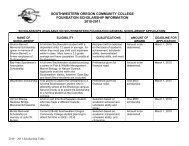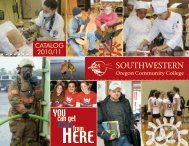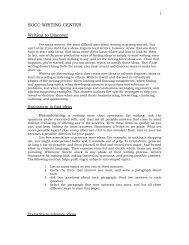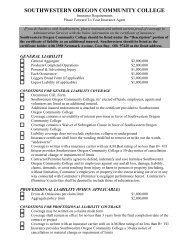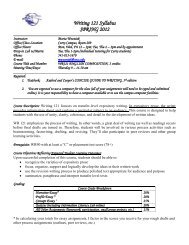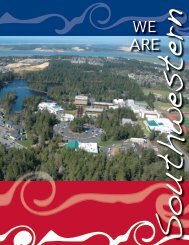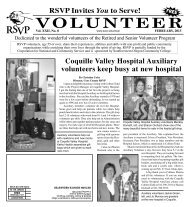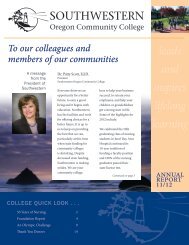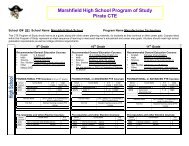Part 1 3.7.qxp - Southwestern Oregon Community College
Part 1 3.7.qxp - Southwestern Oregon Community College
Part 1 3.7.qxp - Southwestern Oregon Community College
You also want an ePaper? Increase the reach of your titles
YUMPU automatically turns print PDFs into web optimized ePapers that Google loves.
Course Descriptions<br />
ED114 Instructional Strategies in Math and<br />
Science<br />
3 credits (3 lec hrs/wk)<br />
This introductory course for future educators will focus on<br />
specific mathematical and scientific concepts, the<br />
application of these mathematical and scientific concepts<br />
in problem solving, and the development of a positive<br />
attitude toward mathematics and science. Math concepts<br />
covered include patterns, estimation, graphing, addition,<br />
subtraction, multiplication, division, and fractions.<br />
Science concepts include observation, communication,<br />
comparison/measurement, organization/classification,<br />
and relating observations. Hands-on activities in science<br />
areas such as biology, geology, or physical science will<br />
offer students opportunities to observe and to<br />
communicate, compare, measure, organize, find<br />
patterns, relate one observation to another, and integrate<br />
math within developing science concepts. Students will<br />
use these skills to develop math and science activities<br />
and lesson plans for use in their practicum experiences,<br />
future classrooms,and particular grade-level interests.<br />
ED126 Tutoring Certification I<br />
2 credits (10 lec, 30 lab hrs/total)<br />
Provides techniques for acquainting adults with basic<br />
communications and computational skills. Lecture and<br />
laboratory includes practice in tutoring adults in reading,<br />
writing, and mathematics.<br />
Prerequisite: Instructor consent.<br />
ED127 Tutoring Certification II<br />
2 credits (2 lec hrs/wk for 5 wks<br />
and 3 lab hrs/wk for 10 wks)<br />
Provides techniques for acquainting adults with basic<br />
communication and computational skills. Lecture and<br />
laboratory includes practice in tutoring adults in reading,<br />
writing, and mathematics.<br />
Prerequisite: ED126 with a “C” or better.<br />
ED128 Tutoring Certification III<br />
2 credits (2 lec hrs/wk for 5 wks<br />
and 3 lab hrs/wk for 10 wks)<br />
Provides techniques for acquainting adults with basic<br />
communication and computational skills. Lecture and<br />
laboratory includes practice in tutoring adults in reading,<br />
writing, and mathematics.<br />
Prerequisite: ED127 with a “C” or better.<br />
ED130 Comprehensive Classroom Management<br />
3 credits (3 lec hrs/wk)<br />
This course provides current theory and<br />
methodology effective in managing small and large<br />
groups of students so that those students choose to be<br />
productively involved in instructional activities. Major<br />
factors or skill areas of effective classroom management<br />
will include: 1) understanding students; personal/<br />
psychological and learning needs, 2) establishing positive<br />
teacher-student relationships, 3) implementing<br />
instructional methods that facilitate optimal learning, and<br />
4) using organizational and group management methods<br />
that maximize on-task student behavior.<br />
ED133 Instructional Media and Materials<br />
3 credits (3 lec hrs/wk)<br />
This course covers the preparation and use of<br />
instructional media and materials commonly found in<br />
public schools. An introduction to computers and other<br />
learning technologies; and how to design lessons using<br />
these materials will be included. Students will develop<br />
an understanding of the place for and importance<br />
of instructional tools in the implementation of<br />
curricular programs.<br />
ED169 Overview of Students with Special Needs<br />
3 credits (3 lec hrs/wk)<br />
An introductory course covering the handicapping and<br />
medical conditions that teachers in the public and private<br />
sector must be able to recognize and understand in order<br />
to plan accordingly. The following are special conditions<br />
which may be covered: learning disabled, mentally<br />
retarded, severely emotionally disturbed, speech and<br />
language impaired, vision and hearing impaired,<br />
physically handicapped, other health impairments,<br />
autism, traumatic brain injuries, Tourette's syndrome, and<br />
attention deficit disorder. Although not a handicapping or<br />
medical condition, the needs of at-risk youth and<br />
techniques for teaching students for whom English is a<br />
second language will be presented. This course is also<br />
offered on-line.<br />
ED258 Multicultural Education<br />
3 credits (3 lec hrs/wk)<br />
A course that will introduce the student to anti-bias<br />
curriculum. Students will be instructed in how to<br />
creatively value diversity and help children respect<br />
each other as individuals; confronting, transcending<br />
and eliminating barriers based on race, culture, gender,<br />
or ability.<br />
ED266 Current Issues in Special Education<br />
3 credits (3 lec hrs/wk)<br />
This course is designed to provide students with<br />
an opportunity to explore, in depth, current special<br />
education issues. Students will review current<br />
philosophical frameworks, legislative changes, emerging<br />
conditions, and technological advances in the field of<br />
special education.<br />
<strong>Southwestern</strong> <strong>Oregon</strong> <strong>Community</strong> <strong>College</strong> 2006-07 Catalog www.socc.edu Course Descriptions 167


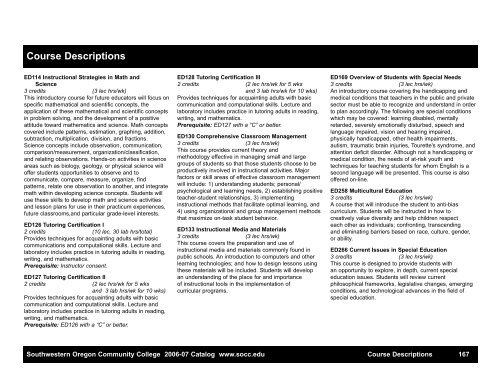
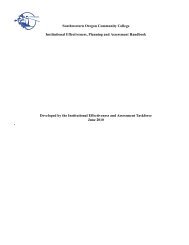
![SWOCC Viewbook [PDF] - Southwestern Oregon Community College](https://img.yumpu.com/26373688/1/190x245/swocc-viewbook-pdf-southwestern-oregon-community-college.jpg?quality=85)

